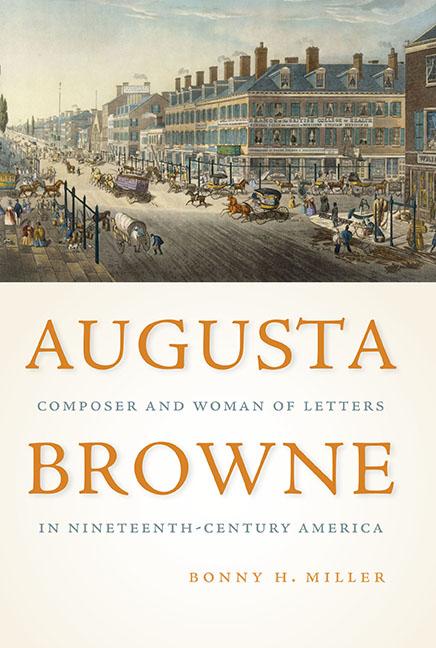Book contents
- Frontmatter
- Contents
- List of Illustrations
- Preface
- Acknowledgments
- Introduction
- 1 First Steps
- 2 Apprentice in a Family Music Business
- 3 Philadelphia Debut
- 4 A Young Professor of Music
- 5 A New Leaf
- 6 Her Own Woman
- 7 Courtship and Consequences
- 8 Pilgrim in Progress
- 9 “Glad Fruition”
- 10 Legacy in Music
- 11 Legacy in Literature
- 12 Contributions to Music Journalism
- 13 A Legacy Written into History
- Appendixes
- Appendixe 1 Children and Descendants of David Samuel Browne and Elizabeth Montgomery Browne
- Appendixe 2 Chronology of Augusta Browne’s Music and Letters
- Appendixe 3 List of Musical Works
- Appendix 4 Selected Glossary
- List of Abbreviations
- Notes
- Selected Bibliography
- Index
3 - Philadelphia Debut
Published online by Cambridge University Press: 23 October 2020
- Frontmatter
- Contents
- List of Illustrations
- Preface
- Acknowledgments
- Introduction
- 1 First Steps
- 2 Apprentice in a Family Music Business
- 3 Philadelphia Debut
- 4 A Young Professor of Music
- 5 A New Leaf
- 6 Her Own Woman
- 7 Courtship and Consequences
- 8 Pilgrim in Progress
- 9 “Glad Fruition”
- 10 Legacy in Music
- 11 Legacy in Literature
- 12 Contributions to Music Journalism
- 13 A Legacy Written into History
- Appendixes
- Appendixe 1 Children and Descendants of David Samuel Browne and Elizabeth Montgomery Browne
- Appendixe 2 Chronology of Augusta Browne’s Music and Letters
- Appendixe 3 List of Musical Works
- Appendix 4 Selected Glossary
- List of Abbreviations
- Notes
- Selected Bibliography
- Index
Summary
As early as July 1836, advertisements for the Browne Logierian Academy began to appear in the Philadelphia press. The family had left Baltimore behind. During November, the Browne music seminary announced a public event in which lectures would be “interspersed with various performances, as Solos, Duets, and concert playing.” The publicity in the Episcopal Recorder promised that “Miss Browne will perform miscellaneous compositions of her own, now in the press in London, under a high patronage; she will also play some pieces now publishing in this city of her compositions.” This announcement demonstrates that Augusta had been composing for some time, even if the assertions of British patronage or publication remain unsubstantiated. She soon had a numbered series of songs and keyboard solos in print with the Philadelphia music publisher George E. Blake. Her father was an experienced music publisher and businessman who could function as her agent and negotiate terms at a time when Augusta was not yet of legal age. Blake gave more details of her ongoing activity in March 1837, when the Philadelphia Inquirer announced that he had “just published several pieces … by Miss Augusta Browne, a young lady who promises to attain an enviable reputation as a composer.”
Blake specifically mentioned three pieces: a song, “The Voice of Spring”; variations on an aria from opera of Lo Zangara [sic]; and variations on a “beautiful air after the manner of the Swiss.” These may be Augusta's earliest surviving works, yet the three imprints bear numbers 9, 11, and 12 on their title pages. Appendix 2 presents a rough sequence of the composer's music and prose titles. The gaps between numbered music scores in the series demonstrate twice as many publications as known titles during her five years of residence in Philadelphia, from 1836 to 1841. Blake numbered her compositions on the title page but did not usually add a copyright date, making it difficult to determine the exact year of publication. It was not uncommon for composers or publishers to reissue the same piece of sheet music in a later year, with a different title or with a different dedication.
- Type
- Chapter
- Information
- Augusta BrowneComposer and Woman of Letters in Nineteenth-Century America, pp. 46 - 65Publisher: Boydell & BrewerPrint publication year: 2020



